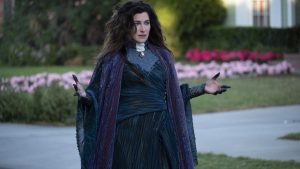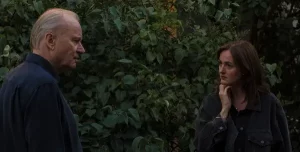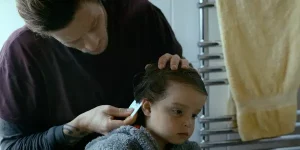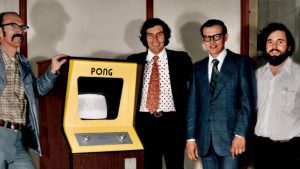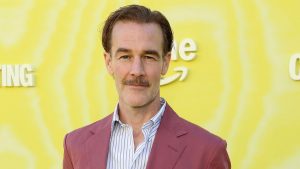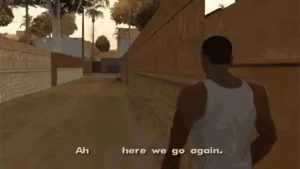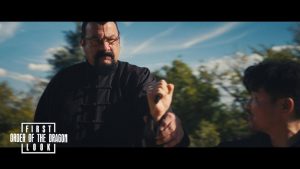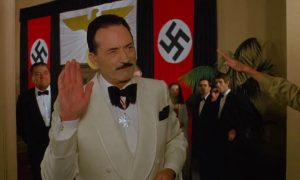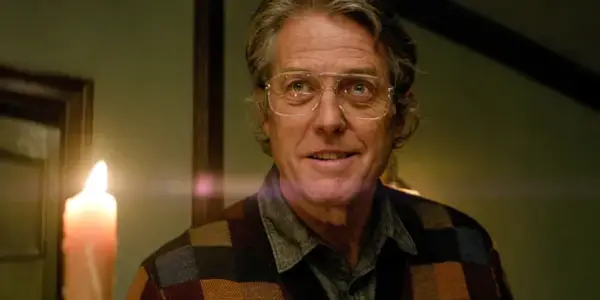
Even outside of Midnight Madness, the Toronto International Film Festival brought quite the number of horror films this year. As one may hope, they span across subgenres and tones, from being bleak and hopeless to being hilarious and insightful. Whether they end up successful or not, it’s exciting to see filmmakers continue to attempt new spins at the genre.
Heretic (Scott Beck and Bryan Woods)
First is what would likely be considered as the most uncomfortable TED talk about religion you’ll ever attend. Writers and directors Scott Beck and Bryan Woods channel the same kind of gonzo energy that made films like Barbarian so great – they remember to keep their horror fun.
Sophie Thatcher and Chloe East play two young Mormon missionaries walking around the neighborhood in the hopes of converting newcomers to their church. Unfortunately, on a rainy day, they take shelter in a house owned by the gentlemanly Mr. Reed (Hugh Grant), who turns out to be a far more difficult and sinister figure than they anticipated.
source: Toronto International Film Festival
Perhaps the most obvious component that makes Heretic stand out from other horror movies is it’s remarkably talky. There is a legitimate screenplay here, as characters throw dialogue at one another not just as chit-chat but as intellectual weapons. Though it does provide the usual bloody violence and gnarly figures, the film is surprisingly sophisticated and nuanced, as it embraces a mental cat-and-mouse that holds your attention throughout the runtime.
Thatcher’s Sister Barnes plays a conventional female protagonist, with the ability to think on her feet and a constant weight of hiding her shady past, while East takes her hilariously religious sensibilities from The Fabelmans (she was the extremely Christian girl who goes out with Sammy) and revisits them here with great depth. But the acting MVP is unsurprisingly Hugh Grant, who has been reveling in the “polite villain” stage of his acting career. From Paddington 2 to Dungeons & Dragons: Honor Among Thieves, Heretic felt like the performance Grant was working towards. He clicks a hundred percent with Beck and Woods’ script, completely understanding every dramatic beat on whether it’s supposed to be creepy or funny.
Heretic as a whole feels like a movie walking on a tightrope. It juggles several tones together, and as our sisters navigate through the house and find their way out, the film keeps you constantly guessing as to how this will all end. Though the third act may feel a tad weaker than its setup (simply because the setup is so exquisitely done), this is a horror film that knows its identity in and out, and manages to have a ton of fun along the way.
Presence (Steven Soderbergh)
Next we have Presence, which is easily the most experimental horror film of the year – a quality that has kept Steven Soderbergh a fascinating filmmaker over the years. The premise is something we have all seen before. A family moves into a new house that is revealed to be haunted by a ghost. But here’s the twist: The entire film is shot from the ghost’s perspective.
source: Toronto International Film Festival
From the first shot to the last, Presence will have the camera start on the second floor, looking out the bedroom window, then come down the stairs into the kitchen, following our human characters and listening in on their drama. The result is a remarkable dance between actor and camera, forcing the audience to gain an incredibly invasive amount of access. Since the human characters don’t know they’re being watched – at least until the daughter Chloe (Callina Liang) begins to sense our presence – we’re given the impression that we’re stalkers. This creates a unique sense of tension that is unlike all other horror films that came before. While other supernatural horror films are about us trying to figure out what the threat is, Presence is about whether or not we get caught.
Accompanying this gimmick is a mesh of tones that range from bleak to hilarious, as we come to learn about this family’s tragic past and how it directly ties with Chloe. Chris Sullivan gives a terrific performance as the father of the house, as we appreciate his empathetic approach to solving every problem, while still having his cringey dad-joke moments. Lucy Liu plays the distant mother, who wrestles with tragedy by keeping herself busy. It’s a role that is less noticeable, at least until the ending, where Liu has a moment that will stay with you long after the film is over.
Though inevitably light on story, Presence is such an impressive feat in the technical department, as Soderbergh churns out oner after oner that can rival Emmanuel Lubezki and Roger Deakins. The film is worth watching just on that front alone. It’s an experiment that was well thought out, carefully planned, and in the end, fun and worthwhile.
Hold Your Breath (Will Joines and Karrie Crouse)
Lastly, we have Hold Your Breath, a film that carries such promise with its concept. On paper, it presents itself as a “Babadook in the Dust Bowl,” with the story of an overprotective mother (Sarah Paulson) becoming convinced that a mysterious threat called “The Grey Man” is coming to take her daughters. Add a 1930s Oklahoma setting, in which our family’s dry farm household contains a unique sense of gothic claustrophobia, and you’re set for a great film.
Which is why it gives me no pleasure to say that Hold Your Breath is frustratingly underwritten, with not enough story beats to carry its 94 minute runtime. The result is a film that feels repetitive and drawn out. Remarkably, the film holds many similarities to Run Rabbit Run, another disappointing horror film that premiered on Sundance and was later picked up by Netflix. Both films contain a phenomenal lead female performance (Sarah Snook in Run Rabbit Run, Paulson here) that sadly couldn’t go anywhere because the script is doing the same thing over and over.
source: Toronto International Film Festival
Too often, the film resorts to loud sounds and jumpscares to unsettle the audience, whether it’s from Paulson’s screams or the shrill noise of a dust storm. It’s just a shame because directors Will Joines and Karrie Crouse have great sensibilities on how to make the most of their locations. The production design, lighting, and cinematography are all handsomely put together – it’s all the right ingredients to make a great-looking horror flick.
Even the script flirts with certain ideas that are interesting, from the pressure of belonging in a community to how one may be forced to self-isolate. Later in the story, the film also includes some truly intimate moments between mother and daughter, where Paulson gets to share some tenderness with co-star Amiah Miller (War For the Planet of the Apes). But time and time again, the drama is saddled with questionable dialogue and acting choices or even bizarre tangents – one particular subplot with Ebon Moss-Bachrach as a spiritual(?) preacher goes nowhere.
By the time Hold Your Breath gets to its third act and climax, certain characters make certain choices that again, on paper, are terrific and emotionally resonant. The ending, in particular, is probably the highlight of the film. It’s so great that you’d wish the rest of the script had more stuff going on. It simply comes down to not enough happens. Even when Paulson is giving a delightfully unhinged performance, the film can’t escape the impression of constantly spinning in place.
Does content like this matter to you?
Become a Member and support film journalism. Unlock access to all of Film Inquiry`s great articles. Join a community of like-minded readers who are passionate about cinema – get access to our private members Network, give back to independent filmmakers, and more.

